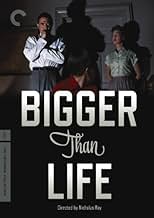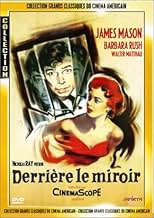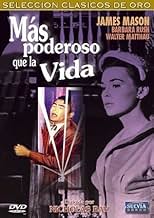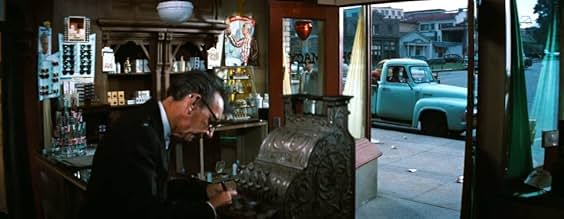IMDb RATING
7.4/10
8.4K
YOUR RATING
A seriously-ill schoolteacher becomes dependent on a "miracle" drug that begins to affect his sanity.A seriously-ill schoolteacher becomes dependent on a "miracle" drug that begins to affect his sanity.A seriously-ill schoolteacher becomes dependent on a "miracle" drug that begins to affect his sanity.
- Awards
- 2 nominations total
Robert F. Simon
- Dr. Norton
- (as Robert Simon)
David Bedell
- X-Ray Doctor
- (uncredited)
Gail Bonney
- Mother at PTA Meeting
- (uncredited)
Harold Bostwick
- Gentleman
- (uncredited)
Lovyss Bradley
- Churchgoer
- (uncredited)
Mary Carroll
- Mother at PTA Meeting
- (uncredited)
Virginia Carroll
- Mrs. Jones
- (uncredited)
Mary Carver
- Saleslady
- (uncredited)
Betty Caulfield
- Mrs. LaPorte
- (uncredited)
Storyline
Did you know
- TriviaThe main manufacturers of cortisone at the time, Merck in the US and Glaxo in the UK, were worried about the impact of this film on the public and their willingness to take the drug if prescribed by their physician. However, by the time of this film's release, newer and better formulations of the drug, along with greater knowledge of its uses and limitations had reduced (but not eliminated) the side-effects experienced by Ed in this film.
- GoofsWhen Ed has a barium X-ray, the image of the swallowed fluid is anatomically inaccurate. The fluid falls straight down to an extremely large "stomach" in his groin area.
Featured review
Bigger than Life (1956)
Tightly made, vividly acted film about a contemporary crisis--the use and abuse of a new "miracle" drug. Watching James Mason suffer, and then make other people suffer, and then face the final bells of his life, is half the movie. He's such a uniquely subtle and powerful actor (at the same time), always filled with poise and a whiff of kindly diffidence.
In a way, this is a precursor to the recent movie idea in "Limitless," where a drug makes you "bigger than life," though this is no fantasy. The drug here is cortisone, ingested orally. It had been understood as a natural (adrenal gland) steroid hormone and was manufactured (by Merck) and on the market by around 1950. And by 1956 when this movie came out it was considered a new kind of penicillin, but rather than just be an antibiotic, it seemed to just make you stronger against all kinds of ailments, especially those that involved swelling of some kind.
Director Nicholas Ray does his usual wonders with interpersonal drama and makes this quite believable, as well as dramatic, and Joe MacDonald does his usual wonders with the camera-work. The writing, too, is crisp and believable (both Ray and Mason helped with the screenplay). In all, it's a top shelf production and a great story.
But it fails somehow to be a great film, and I think the main reason is the hook to the plot, about the wonder drug, is a little too neatly packaged, with a few scenes that are almost like public service announcements. We sort of know before we are "supposed" to know that it's going to go bad--the clues go beyond foreshadowing--and so when we find out we are right, the edge is off of the narrative. Only the very end is left hanging, though you figure, with Merck keeping an eye on things, that events really can't go too wrong. According to Wikipedia, the American response at the time was shock and the movie did poorly (I guess because it looked like an attack on the nuclear family, such was the 1950s).
But the critics loved it then and like it now. A movie this well made is still a thrill to watch for all the small things--Walter Matthau in a caricatured side role as the good Uncle, the psychological effects as manifest in Mason, and even the glimpse into the attitude toward medicine at the time. I don't think it's a typical reaction to cortisone, however (from what I've read)--this is a particular case where some inherent manic-depression is triggered, and exaggerated. It would be interesting to see this re-calibrated and filmed again in modern times, but with the subtlety here, the destruction of an ordinary family without shameless excess.
Tightly made, vividly acted film about a contemporary crisis--the use and abuse of a new "miracle" drug. Watching James Mason suffer, and then make other people suffer, and then face the final bells of his life, is half the movie. He's such a uniquely subtle and powerful actor (at the same time), always filled with poise and a whiff of kindly diffidence.
In a way, this is a precursor to the recent movie idea in "Limitless," where a drug makes you "bigger than life," though this is no fantasy. The drug here is cortisone, ingested orally. It had been understood as a natural (adrenal gland) steroid hormone and was manufactured (by Merck) and on the market by around 1950. And by 1956 when this movie came out it was considered a new kind of penicillin, but rather than just be an antibiotic, it seemed to just make you stronger against all kinds of ailments, especially those that involved swelling of some kind.
Director Nicholas Ray does his usual wonders with interpersonal drama and makes this quite believable, as well as dramatic, and Joe MacDonald does his usual wonders with the camera-work. The writing, too, is crisp and believable (both Ray and Mason helped with the screenplay). In all, it's a top shelf production and a great story.
But it fails somehow to be a great film, and I think the main reason is the hook to the plot, about the wonder drug, is a little too neatly packaged, with a few scenes that are almost like public service announcements. We sort of know before we are "supposed" to know that it's going to go bad--the clues go beyond foreshadowing--and so when we find out we are right, the edge is off of the narrative. Only the very end is left hanging, though you figure, with Merck keeping an eye on things, that events really can't go too wrong. According to Wikipedia, the American response at the time was shock and the movie did poorly (I guess because it looked like an attack on the nuclear family, such was the 1950s).
But the critics loved it then and like it now. A movie this well made is still a thrill to watch for all the small things--Walter Matthau in a caricatured side role as the good Uncle, the psychological effects as manifest in Mason, and even the glimpse into the attitude toward medicine at the time. I don't think it's a typical reaction to cortisone, however (from what I've read)--this is a particular case where some inherent manic-depression is triggered, and exaggerated. It would be interesting to see this re-calibrated and filmed again in modern times, but with the subtlety here, the destruction of an ordinary family without shameless excess.
- secondtake
- Sep 30, 2011
- Permalink
- How long is Bigger Than Life?Powered by Alexa
Details
- Release date
- Country of origin
- Languages
- Also known as
- One in a Million
- Filming locations
- Production company
- See more company credits at IMDbPro
Box office
- Budget
- $1,000,000 (estimated)
- Runtime1 hour 35 minutes
- Color
- Aspect ratio
- 2.55 : 1
Contribute to this page
Suggest an edit or add missing content
































